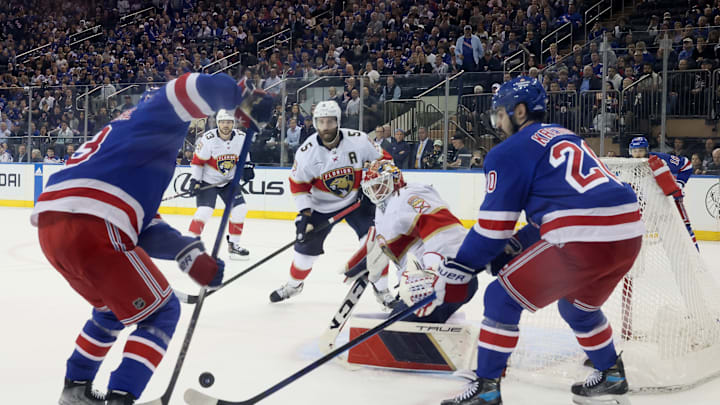For the first time in the Stanley Cup playoffs and for the first time since Dec. 9 against the Washington Capitals, the New York Rangers were shut out in Game 1 of the Eastern Conference Finals against the Florida Panthers. New York put 24 shots on Panthers goaltender Sergei Bobrovsky, but couldn't find the back of the net.
Bobrovsky put on a clinic and made the saves he had to - he stopped two breakaways on Braden Schnieder and Will Cuylle, somehow kept the puck out of the net with just over seven minutes remaining when it looked like New York was going to tie the game.
But, it wasn't like New York was completely outplayed for 60 minutes, and moreover, they got some opportunities. Here are three offensive takeaways New York can take from their Game 1 loss.
There will be odd-man rushes
The Florida Panthers are one of the top teams in the NHL at even strength: they led the NHL in the regular season with a +67 goal differential at even strength and pride themselves on taking inches away from their opponents. This was the case throughout the game on Wednesday night, as many Blueshirts struggled to create chances because there was always a white sweater right near them.
But, at the same time, this style can backfire against fast teams like the Rangers, and it leads to open ice. New York had odd-man rushes, though they couldn't finish it off. But, in the series, they're going to need to as it might be the only space Florida gives them.
This is what the Florida Panthers are, with a backbone so strong that they are able to give up chances, knowing Sergei Bobrovsky will make saves when they need him to, especially when the game goes on. New York has to find a way to break this, especially when they have opportunities.
The Rangers need to score on the power play
Against the Panthers, the Rangers face the same dilemma they faced against the Carolina Hurricanes, a team that has superior 5v5 play. Carolina had a +66 goal differential at even strength during the regular season, one behind Florida, and the Rangers beat them with their special teams model.
Think of the four wins against the Hurricanes - New York scored at least one goal at non-even strength in each game, and moreover, scored a power play goal in three out of the four. In the two games they lost, the Rangers were unable to score on the man-advantage.
This postseason, the Panthers have the third best penalty kill at 86.2% (only the Edmonton Oilers and Rangers are higher), and for a power play that is opportunistic as the Rangers are, they need to score. The talk can be about how Florida outplays them at 5v5, but it doesn't matter if New York scores using special teams.
Contributors are needed up and down the lineup
It's obvious and it can be said in every game and every series, but it's still worth saying: the New York Rangers cannot be reliant on one or two lines every night. They need more than that to create offensive chances or else they'll be trailing the Panthers all series.
Last night, the only line that outshot its Florida counterpart at 5v5 was Artemi Panarin, Vincent Trocheck and Alexis Lafreniere, which has been New York's best line all season. Clearly, production from only this line is not enough.
What do the Rangers need to do? First, figure out the third player who will best supplement Mika Zibanejad and Chris Kreider; New York needs both of them to be consistently good on offense to have a chance in the series. Second, they need some stability and over nine forwards who can be trusted in the third period; the Panthers are a deep team and New York needs to match that.
No matter who the contributions come from - the top six, bottom six, power play penalty kill, whatever it is - the Rangers need something and it needs to be better than last night. As the series goes on, it will become more and more apparent for a Rangers team that has been able to respond to challenges all year.
Florida is the biggest challenge they've faced, and the Rangers need a new response.
